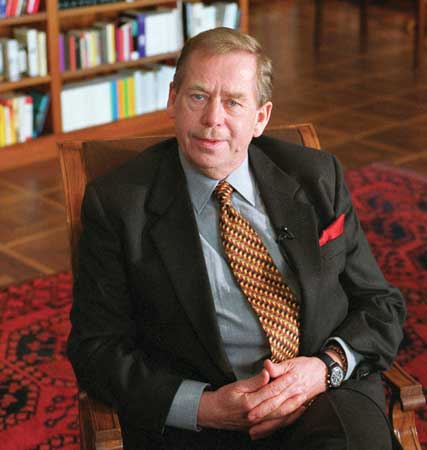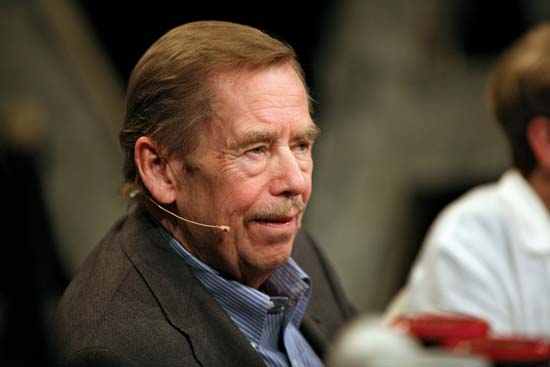Václav Havel (5 Oct 1936 – 18 Dec 2011)
BIOGRAPHIES, 3 Oct 2016
Encyclopædia Britannica – TRANSCEND Media Service
Václav Havel, (born October 5, 1936, Prague, Czechoslovakia [now in Czech Republic]—died December 18, 2011, Hrádeček, Czech Republic), Czech playwright, poet, and political dissident, who, after the fall of communism, was president of Czechoslovakia (1989–92) and of the Czech Republic (1993–2003).
Havel was the son of a wealthy restaurateur whose property was confiscated by the communist government of Czechoslovakia in 1948. As the son of bourgeois parents, Havel was denied easy access to education but managed to finish high school and study on the university level. He found work as a stagehand in a Prague theatrical company in 1959 and soon began writing plays with Ivan Vyskočil.
By 1968 Havel had progressed to the position of resident playwright of the Theatre of the Balustrade company. He was a prominent participant in the liberal reforms of 1968 (known as the Prague Spring), and, after the Soviet clampdown on Czechoslovakia that year, his plays were banned and his passport was confiscated. During the 1970s and ’80s he was repeatedly arrested and served four years in prison (1979–83) for his activities on behalf of human rights in Czechoslovakia. After his release from prison Havel remained in his homeland.
Havel’s first solo play, Zahradní slavnost (1963; The Garden Party), typified his work in its absurdist, satirical examination of bureaucratic routines and their dehumanizing effects. In his best-known play, Vyrozumění (1965; The Memorandum), an incomprehensible artificial language is imposed on a large bureaucratic enterprise, causing the breakdown of human relationships and their replacement by unscrupulous struggles for power.
In these and subsequent works Havel explored the self-deluding rationalizations and moral compromises that characterize life under a totalitarian political system. Havel continued to write plays steadily until the late 1980s; these works include Ztížená možnost soustředění (1968; The Increased Difficulty of Concentration); Spiklenci (1971; The Conspirators); the three one-act plays Audience (1975), Vernisáž (1975; Private View), and Protest (1978); Largo Desolato (1985); and Zítra to Spustíme (1988; Tomorrow).
When massive antigovernment demonstrations erupted in Prague in November 1989, Havel became the leading figure in the Civic Forum, a new coalition of noncommunist opposition groups pressing for democratic reforms. In early December the Communist Party capitulated and formed a coalition government with the Civic Forum. As a result of an agreement between the partners in this bloodless “Velvet Revolution,” Havel was elected to the post of interim president of Czechoslovakia on December 29, 1989, and he was reelected to the presidency in July 1990, becoming the country’s first noncommunist leader since 1948. As the Czechoslovak union faced dissolution in 1992, Havel, who opposed the division, resigned from office. The following year he was elected president of the new Czech Republic. His political role, however, was limited, as Prime Minister Václav Klaus (1993–97) commanded much of the power. In 1998 Havel was reelected by a narrow margin, and, under his presidency, the Czech Republic joined the North Atlantic Treaty Organization (NATO) in 1999. Barred constitutionally from seeking a third term, he stepped down as president in 2003.
Havel’s first new play in more than 20 years—Odcházení (Leaving), a tragicomedy that draws on his experiences as president and presents a chancellor leaving his post while grappling with a political enemy—premiered in 2008. Havel subsequently directed its film adaptation (2011).
Go to Original – britannica.com
DISCLAIMER: The statements, views and opinions expressed in pieces republished here are solely those of the authors and do not necessarily represent those of TMS. In accordance with title 17 U.S.C. section 107, this material is distributed without profit to those who have expressed a prior interest in receiving the included information for research and educational purposes. TMS has no affiliation whatsoever with the originator of this article nor is TMS endorsed or sponsored by the originator. “GO TO ORIGINAL” links are provided as a convenience to our readers and allow for verification of authenticity. However, as originating pages are often updated by their originating host sites, the versions posted may not match the versions our readers view when clicking the “GO TO ORIGINAL” links. This site contains copyrighted material the use of which has not always been specifically authorized by the copyright owner. We are making such material available in our efforts to advance understanding of environmental, political, human rights, economic, democracy, scientific, and social justice issues, etc. We believe this constitutes a ‘fair use’ of any such copyrighted material as provided for in section 107 of the US Copyright Law. In accordance with Title 17 U.S.C. Section 107, the material on this site is distributed without profit to those who have expressed a prior interest in receiving the included information for research and educational purposes. For more information go to: http://www.law.cornell.edu/uscode/17/107.shtml. If you wish to use copyrighted material from this site for purposes of your own that go beyond ‘fair use’, you must obtain permission from the copyright owner.

